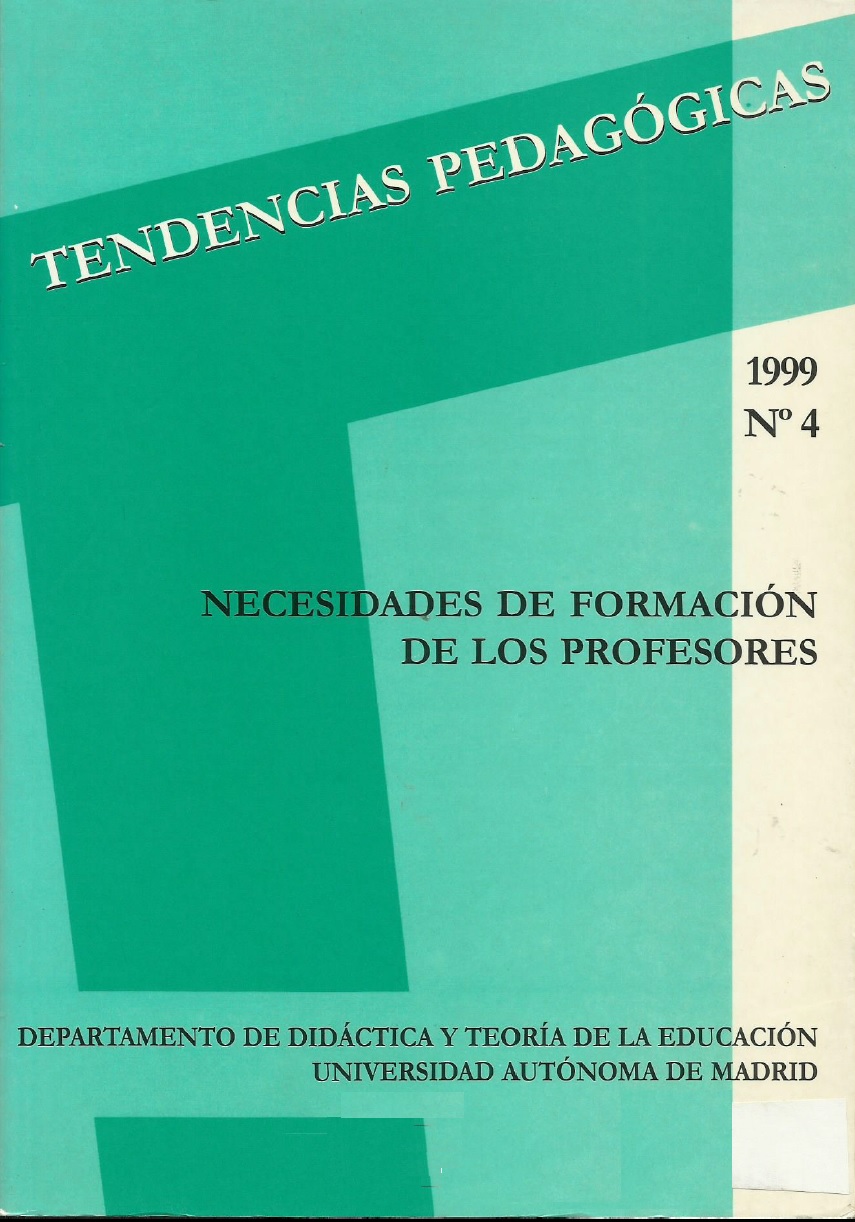Abstract
Teacher training for pre-university levels continues to be a subject for permanent research and investigation due to the considerable changes that are taking place in modern society which demand the constant planning of the figure of the primary and secondary school teacher. International organizations (UNESCO, OEI Geneve, CERI, ) have in the last few years endeavoured to study educational reforms and to annalyse the role of the teacher. In Spain the educational reform advocated by the LOGSE 1990 desings a new profile for the teacher. Due to the importance of the subject we are dealing wtth. we believe it is advisable to ask the following question: wat are the main training needs felt or seen by primary or secondary school teachers in their everyday work? In order to answerthis question an investigation was carried out using a sample of 1,200 teachers from the different autonomous regions. A questionaire was devised as a data gathering tool which dealt with the different areas related to education an a semi structured interview to allow the most important information gathered from the questionaire to be studied in depth. After annalysing the information it seems necessary to emplasize that teachers on the whole want: A more scientific and a more practical training in order to answer the needs felt.
Sorne of their needs and perceotions could be surnmarized as follows: They request more training regarding the role ofthe teacher as a totor in primary and especially in secondary education. Knowledge of strategies and techniques to be used by the teacher: observation, intervews, work habits. To learn how desing and develop properly co-ordinated and contextualized proyects and curriculums. To know how to handle correctly and at the right time new technology applied to teaching and learning. To learn about research strategies for the classroom. To know how to look for research topics and to handle techniques and methods both in a quantitative and qualitative manner. They request more team work and cooperation amongst teachers they are interested in everything related to strategies or techniques for team work, cooperative work where dialogue, and participation and respect for other peoples opinions is fomented.
Downloads
References
ANTÚNEZ, J. (1996) Análisis de los resultados de los programas de formación permanente de Profesorado mediante la evaluación demorada de sus efectos. Madrid: CIDE.
BENEDITO,V. (1991). Formación permanente del profesorado universitario: reflexiones y perspectivas. Ponencia 111 Tornadas de Didáctica Universitaria
«Evaluación y desarrollo profesional». Las Palmas de Gran Canaria.
BENEDITO, V. (Coord.) (1991). El professorat de Primaria i Secundaria a Catalunya. Barcelona: ICE.
CC.OO. (1993). Encuesta al profesorado de Primaria y Secundaria de Enseñanza Pública. Madrid: CIDE.
COMUNIDAD EUROPEA (1996). Enseñar y Aprender. Hacia la sociedad cognitiva. Libro Blanco sobre la educación y la formación. Luxemburgo: Comunidad Europea
CRONBACH, L.J. (1972). Fundamentos de la exploración psicológica. Madrid: Biblioteca Nueva
DELORS,j. (1996). Aprender para el siglo XX. La educación encierra un tesoro. París: Satillana/UNESCO.
GAIRIN,j. (1995). Estudio de las necesidades de formación de los equipos directivos de los centros educativos. Madrid: CIDE.
GARCIA ÁLVAREZ,j. (1993). Formación permanente del profesorado. Mas allá de la Reforma. Madrid, Escuela Española.
GARCIA ÁLVAREZ, J. (1997) Evaluación de la formación del profesorado: Marcos de referencia. Bilbao: Mensajero.
IMBERNON, F. (1994). La formación del profesorado. Barcelona: Paidos.
MARCELO, C. (1994). Formación del profesorado para el cambio educativo. Barcelona: PPU.
MARCELO, C. (1997). ¿"Quiénforma al'formador? Un estudio sobre lastareas profesionalesy necesidades dejorlJJación deasesores deAndalucíay Canarias. Educación, 313 Mayo-Agosto, 249-278
MEC (1989). Plan de Investigación Educativa y de Perfeccionamiento del Profesorado. Madrid: MEC.
MEC (1989). Diseño Curricular Base. Madrid: MEC.
MEC (1994) Centros educativos y calidad de la enseñanza. Madrid: Secretaría de Estado de Educación.
MEC (1997-98). Formación Permanente del Profesorado. Madrid: Subdirección General de Formación del profesorado
OlE (1996). Fortalecimiento del rol de los profesores en un mundo cambiante. Conferencia Internacional de Educación. Ginebra: OlE.
ORTEGA, F. Y VELASCO, A. (1991). La profesión de maestro. Madrid: CIDE
PEREZ, G. (1995). El educador de adultos desde las perspectivas innovadoras de la Reforma Educativa. Madrid: MEC.
PÉREZ SERRANO, M. (1988). La formación práctica del maestro. Madrid: Escuela Española.
PÉREZ, G. (1994). Investigación cualitativa. Retos e interrogantes. 1 Métodos Madrid: La Muralla.
PÉREZ, G. (1994). Investigación cualitativa. Retos e interrogantes. 11Técnicas y análisis de datos. Madrid: La Muralla.
PÉREZ VILLAR, P. (1991). La evaluación de los profesores en prácticas en función de la percepción Social de los alumnos. Madrid: CIDE.
RODRÍGUEZ, G., GIL, J. y GARCÍA, E. (1996). Metodología de la investigación cualitativa. Archidona: Aljibe
SAN FABIÁN, J. (1994). Condiciones y posibilidades de la formación del profesorado en Centros. Hacia un modelo de evaluación. Madrid: CIDE.
VILLAR ANGULO, L.M.(Coord.) (1996). La formación permanente del profesorado
en el nuevo sistema educativo. Barcelona: Oikos-tau.
